CLAS 353
September 24, 2024
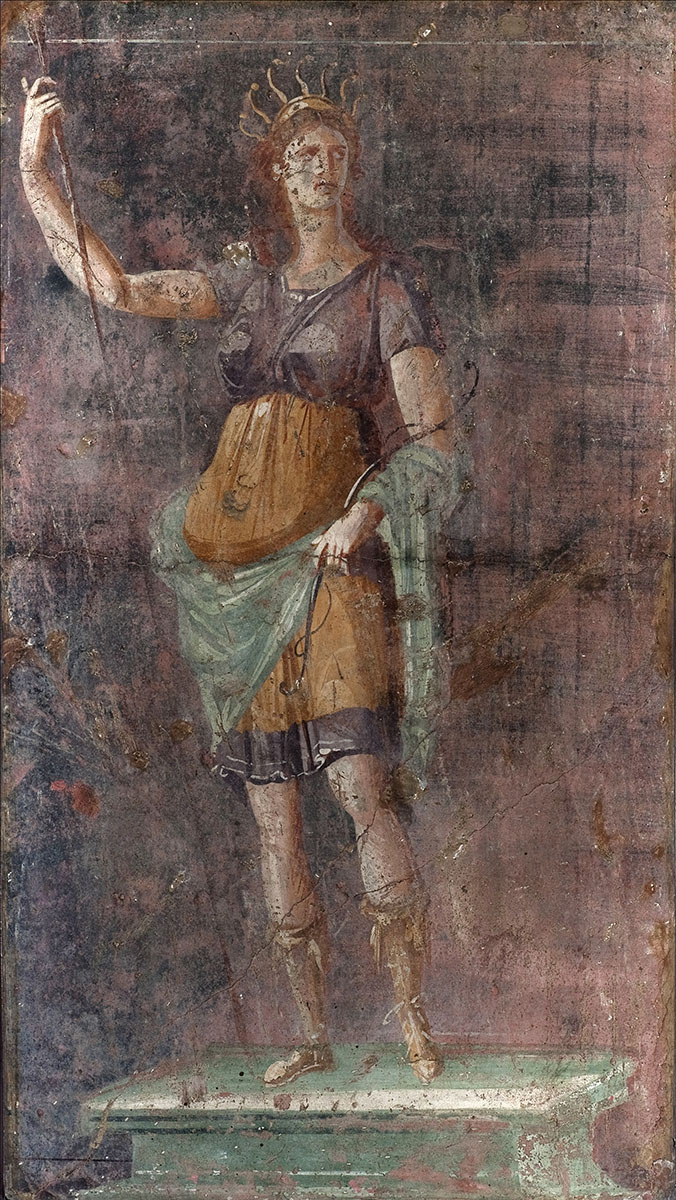
Artemis/Diana (Pompeii, 1st century CE)
Examination #1 Guide (Thursday, September 26)
Practice exam Commentary
Aeneid 10 (cont.)
- Aeneas's battle with Mezentius & death of Lausus; Aeneas's humanity returns (pietas)
Aeneid 10.789-93 (Lausus comes to aid of wounded Mezentius)
But Lausus saw, and groaned
with deep love for his father, shedding tears.
Lausus, I won't silence your memory,
your hard death, or your heroism, if indeed
history tells the truth about your exploits.
Aeneid 11: aftermath of Pallas's death; 12 days truce; conflict among Latins/Italians; Camilla
- return of Pallas’s body
Aeneid 11.67ff. (Pallas's beautiful corpse)
He was like a flower
plucked by a girl's hand, a fragile violet
or drooping hyacinth, whose bloom and beauty
had not started to fade, though Mother earth
no longer offered nourishment or strength.
Aeneas fetched two garments stiff with gold and purple.
Sidonian Dido had made these for him with
her own hands, happy in her task, working
the fabric with fine threads of gold.
- Evander’s call for revenge ("your sword . . . owes Turnus to me / and to my son, 11.178-9)
- Camilla’s epyllion (“mini-epic”), Vergilian creation; Camilla the “Amazon”

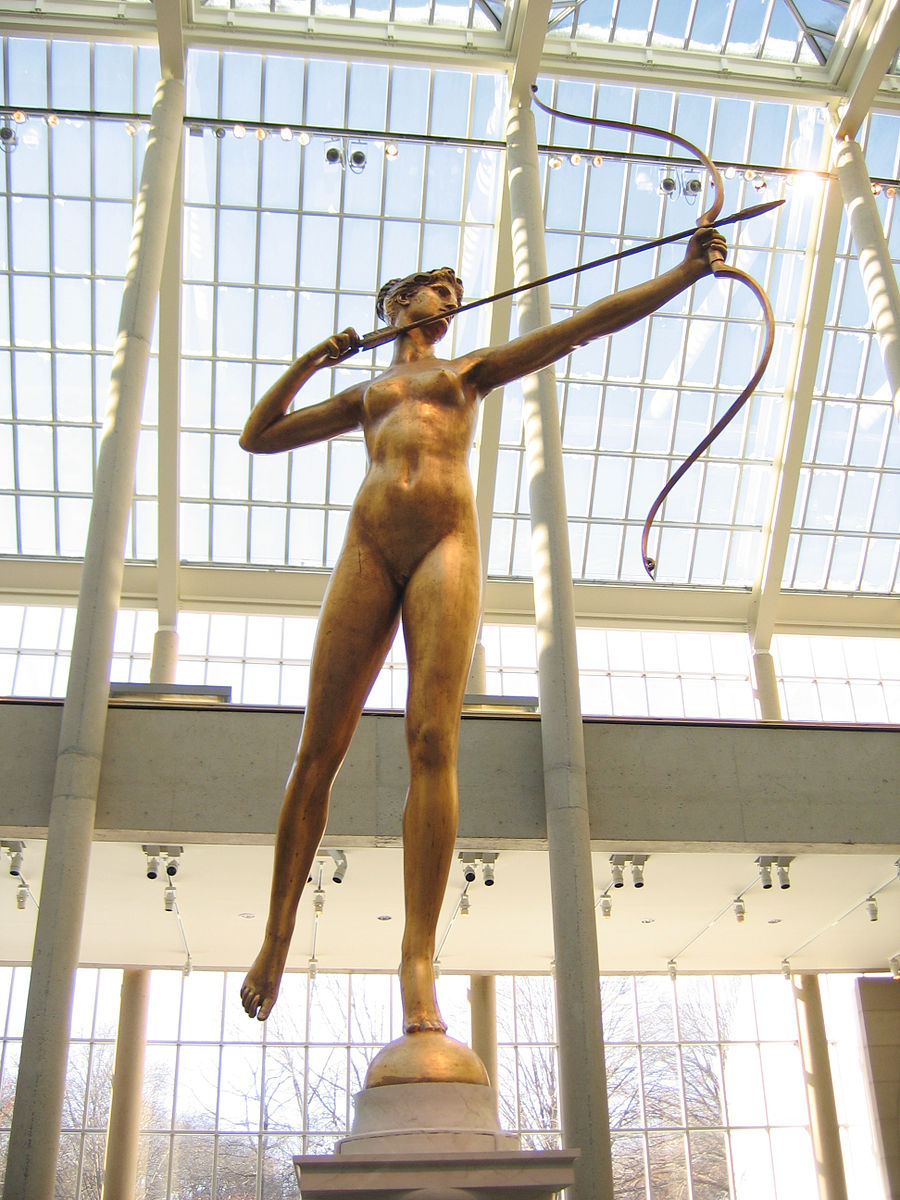
L: Diana mosaic from Tunisia (2nd century CE); R: Saint-Gaudens, Diana (1928)
- epyllion framed by Diana (to Opis); Camilla’s pastoral history before tragic death—boundary-crossing, non-binary story?, 11.535ff. ("Many mothers in the Tuscan towns were keen / to wed her to their sons, in vain. She was happy / with Diana, and nursed an endless love of weapons / and virginity, untouched", 11.581-4)
- aristeia (ax, spear, superpower?) & death
- huntress becomes the hunted (Arruns)
Aeneid 11.778-82 (Camilla spots Chloreus, priest of Cybele, in red, purple & gold Phrygian garb)
The huntress stalked this one man blindly in the strife
of war. She hoped to hang his Trojan weapons
in a temple, or flaunt herself in captive gold
—a girl on fire with a female's lust for spoils,
riding recklessly through all the ranks.
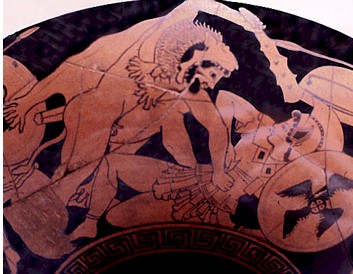
Herakles slays Amazon Hippolyta (5th century BCE)
- Camilla’s wounding by Arruns's spear: "Wedged below / her naked breast, it drank deeply of her blood" (11.803-4)
Aeneid 11.816-31 (Camilla's death)
Camilla, dying, tugged the spear, but its iron
tip was wedged too deeply in her ribs.
Her blood draining, she collapsed; her eyes fell,
chill with death. Her bright complexion faded.
As she died she called to her friend Acca.
She'd been loyal beyond others to Camilla,
the only one to share her cares. "I've fought
this far, sister Acca. Now a bitter wound
has finished me. The world grows dark with shadow.
Run and take these last commands to Turnus:
he must take up the fight and keep the Trojans
from the town. And now, goodbye." She released
her horse's
reins and weakly slipped to earth, cold,
departing from her body bit by bit. Her head
and neck drooped down in death; her weapons fell. Her soul
fled with a groan of protest to the shades below.
[vitaque cum gemitu fugit indignata sub umbras (11.831); cf. epic's final line (12.952)]
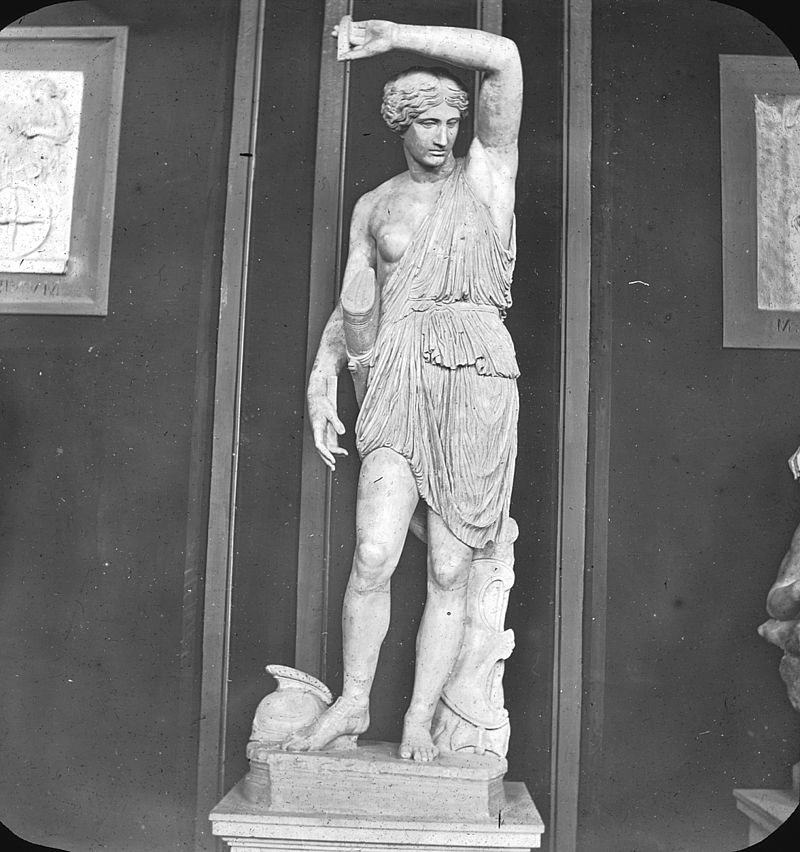
Wounded Amazon (Roman copy of Greek statue)
- Latin (married) women inspired by Camilla ("On the walls, trembling mothers strained to rain down / weapons on the Trojans, mimicking Camilla, / spurred by love of country . . .", 11.890ff.)
Aeneid 12: failed duel, final settlement (Jupiter & Juno) & final combat
- Turnus accepts single combat vs. "Trojan traitor" (12.14), Latinus & Amata dissuade him (cf. Priam & Hecuba to Hector in Iliad 22);
Aeneid 12.60-72 (Amata to Turnus; Lavinia's blush – preference or modesty?)
"I ask just this: don't fight
the Trojan. Your fate in that duel's mine as well:
I'll leave this hated light of day with you.
I'll never be enslaved and see Aeneas as
my son-in-law." Lavinia heard her mother's words.
Tears ran down her burning cheeks; a deep blush
warmed her skin and spread its fire through her face,
just like Indian ivory stained by crimson blood
or snowy lilies tinted red by a rose
bouquet. Such colors stood out on the young girl's face.
His love churned in Turnus.
[Lavinia's closeness to her mother: with Amata on way to temple, "Lavinia sat beside her, / the cause of so much grief, her lovely eyes cast down"," 11.479-80; after Amata's suicide, "first Lavinia tore her golden hair and gouged / her rosy cheeks", 12.606-7)]
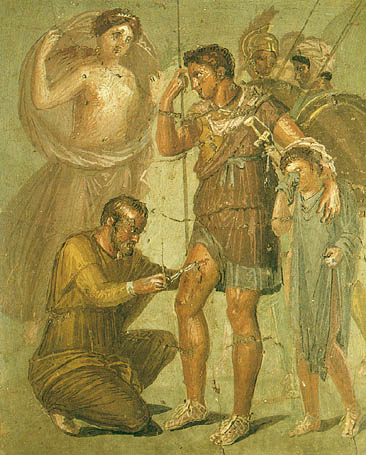
Aeneas's surgery fresco (Pompeii, 1st century CE)
- fighting resumes: Juturna, river nymph & Turnus's sister—her story?
- Aeneas wounded; narrator highlights senselessness of war:
Aeneid 12.500-4 ("civil" war?)
What god can help me sing of so much horror,
the great slaughter and slain generals, the men
whom Turnus, then the Trojan hero, drove over
the plain? Jupiter, did you want nations fated
for eternal peace to clash so violently?

Achilles & Hector (Attic vase, ca. 490 BCE)
- Aeneas ("Achilles"?) chases Turnus around Latinus's walls (cf. running-race simile, Iliad 22.158ff.), ". . . since they sought no small or paltry / prize, but vied for Turnus' life and blood" (12.764-5)
- divine settlement (Jupiter & Juno, 12.830ff.): name of "Troy" expunged, Latin language & customs preserved ("You'll see a race arise from their mixed blood / that will surpass both gods and men in piety", 12.838-9)
- Juturna dismissed by Fury/owl
Aeneid 12.876-81 (Jupiter's justice?)
"I know the deadly drumming
of your wings. Great Jove's proud commands
are clear. Is this my virginity's reward?
Why give me immortality? Why can't I die
as humans do? Then I could end this crushing grief
and follow my sad brother to the shades."
- final duel of Aeneas & Turnus

Giordano, Aeneas Defeats Turnus (17th century)
Aeneid 12.926-52 (Aeneas wounds Turnus)
His legs folded, and huge Turnus crumpled
to the ground. The Rutulians leapt up groaning.
The hills
and forests echoed their cry far and wide.
Humbly, Turnus raised his eyes, his hands,
and begged: "I deserve this. I don't ask for mercy:
use your chance. But if a parent's grief can touch you,
have pity for old Daunus (you had such a father
in Anchises) and return
me to my people,
as a corpse if you prefer. You've won,
the Ausonians have seen me stretch my hands out
in defeat. Lavinia's yours; give up your hate."
Fierce Aeneas stood there, armed, his eyes
roaming restlessly, holding back the death-blow.
And now more and more, Turnus' words began
to move him and he hesitated—when high on Turnus'
shoulder, he saw the fatal sword-belt of young Pallas,
the strap flashing with its well-known studs—Pallas,
whom Turnus killed when down, and took that emblem
of the enemy to wear upon his shoulder.
Aeneas drank in this reminder of his savage
grief. Ablaze with rage, awful in anger, he cried,
"Should I let you slip away, wearing what you
tore from one I loved? Pallas sacrifices
you, Pallas punishes your profane blood"—and,
seething, planted his sword in that hostile heart.
Turnus' knees buckled with chill. His soul fled
with a groan of protest to the shades below.
- mercy vs. revenge? Cf. Anchises's' instructions to Aeneas ("You, Roman, remember your own arts: to rule / the world with law, impose your ways on peace, / grant the conquered clemency, and crush the proud in war", 6.847ff.); cf. ending of Iliad
[Augustus, Res Gestae 3.1-2 (ca. 13 CE): "I often undertook civil and foreign wars by sea and land throughout the world, and as a victor I spared all citizens who asked for pardon. The foreign peoples that could safely be pardoned I preferred to save rather than kill."]
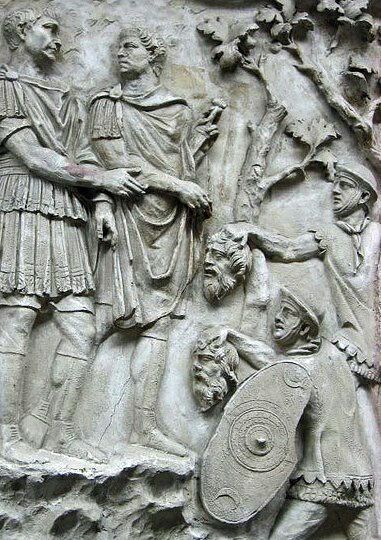
Detail of Trajan's Column (106-113 CE)
- Aeneas as prototype of Roman/Augustan imperial hero? (Roman exceptionalism, Rome as "civilizing" force, etc.?)
- Aeneid as reconstruction text for post civil-war world?
- Vergil's public/optimistic vs. private/skeptical voice?









